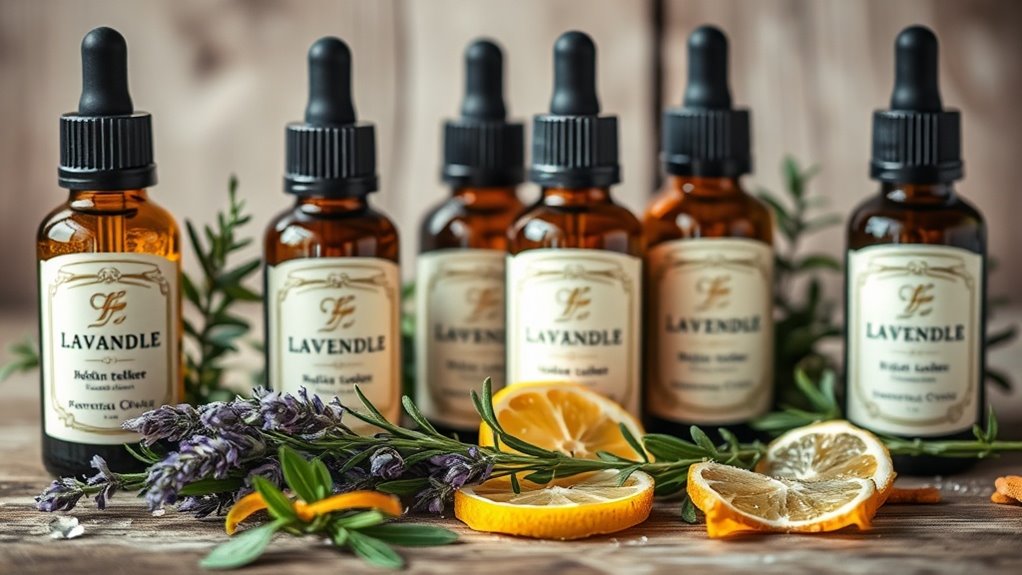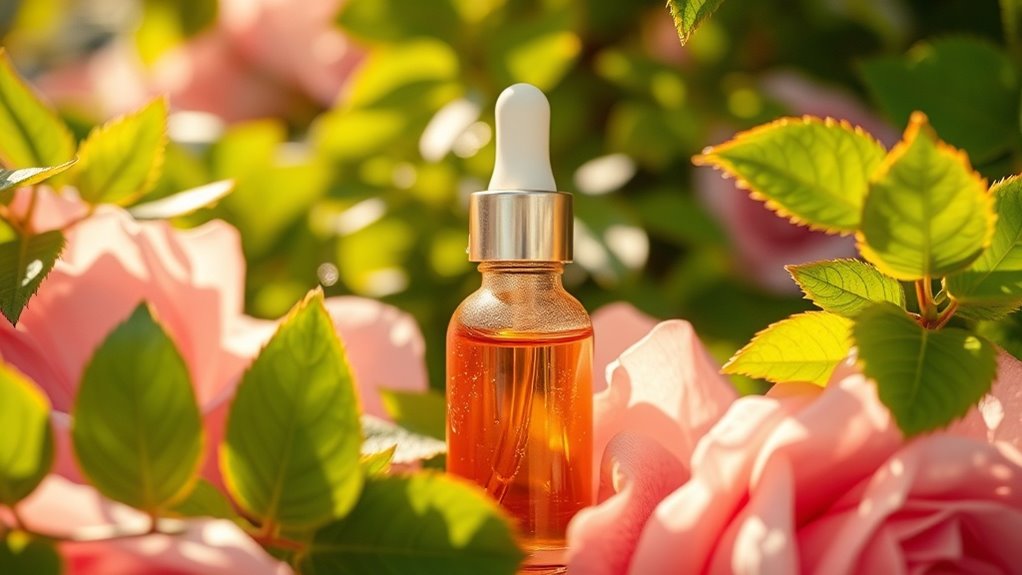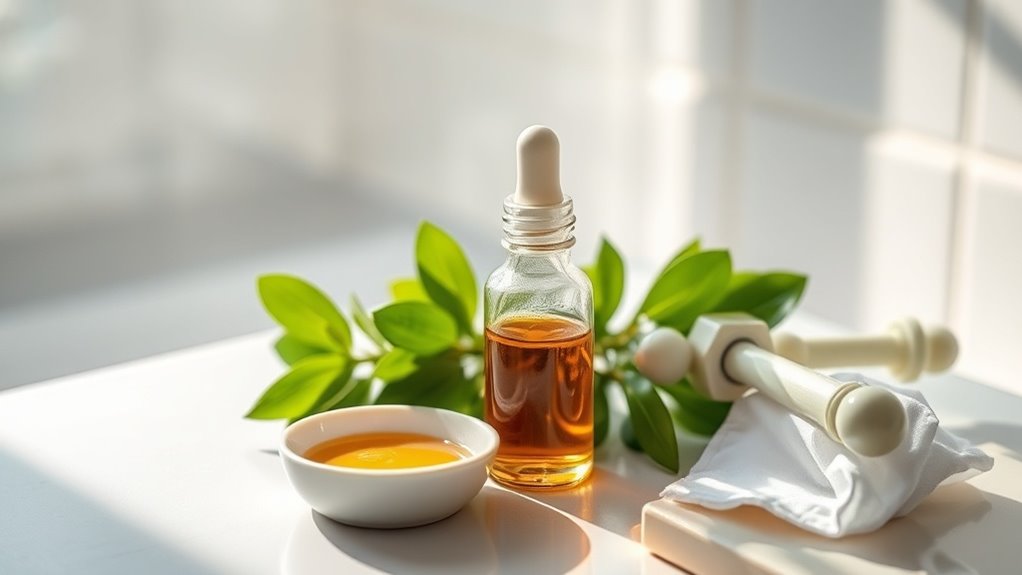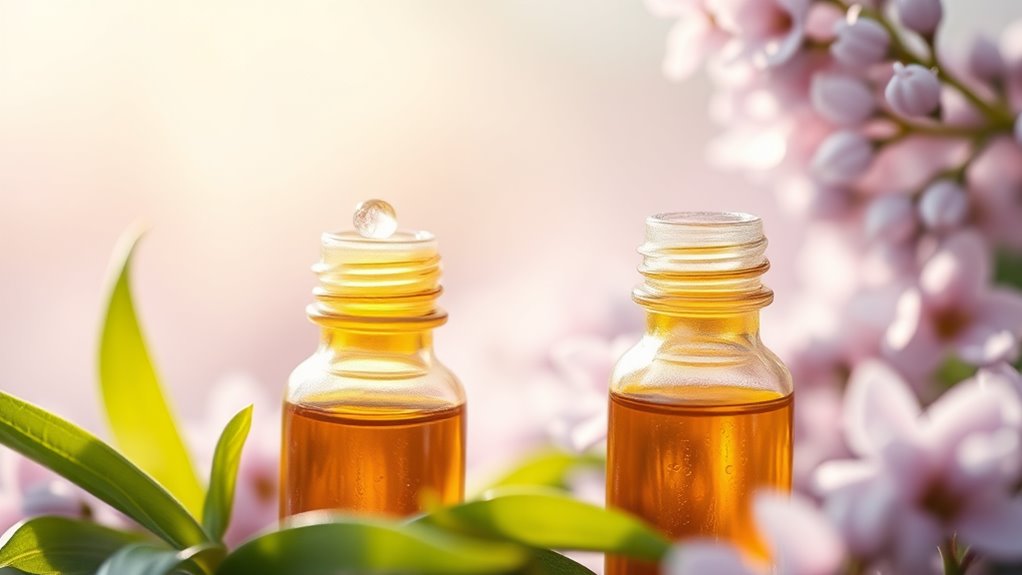6 Essential Oils Dermatologists Secretly Love for Skin
If you’re seeking natural solutions for your skin concerns, you might be surprised to learn that dermatologists often rely on essential oils. These oils, like Tea Tree and Lavender, offer impressive benefits, from fighting acne to soothing inflammation. But what exactly makes these six oils stand out in the realm of skincare? Understanding their unique properties can transform your approach to skin health and wellness. Let’s explore what each oil can do for you.
Tea Tree Oil
Tea Tree Oil, derived from the leaves of the Melaleuca alternifolia tree, is renowned for its potent antimicrobial properties.
This essential oil is a favorite among dermatologists for its efficacy in treating various skin conditions, including acne and fungal infections.
When you apply it topically, it can help reduce inflammation and promote healing.
Additionally, its antibacterial qualities combat the bacteria that contribute to breakouts, making it one of the top oils for skin health.
Always dilute it with a carrier oil to prevent irritation, and consider patch testing before widespread use to ensure your skin tolerates it well. Moreover, its ability to combat bacteria is well-documented, reinforcing its status as a go-to treatment in skincare.
Lavender Oil
While Tea Tree Oil is excellent for combating acne and infections, Lavender Oil offers a different set of benefits for skin health.
Known for its soothing properties, Lavender Oil can help reduce redness and irritation, making it ideal for sensitive skin.
Its antimicrobial properties may assist in preventing breakouts, while its calming scent promotes relaxation, potentially aiding in stress-related skin issues.
Additionally, studies suggest that Lavender Oil enhances wound healing, making it useful for minor cuts and burns. Moreover, its antimicrobial properties can further support overall skin health by preventing harmful bacteria from proliferating.
Frankincense Oil
Frankincense Oil, often referred to as the “king of oils,” is renowned for its remarkable skin benefits. It’s prized for its anti-inflammatory and astringent properties, making it ideal for reducing blemishes and promoting a more even skin tone. Here’s a quick overview of its benefits:
| Benefit | Description | Usage |
|---|---|---|
| Anti-Aging | Reduces fine lines and wrinkles | Apply diluted on face |
| Scar Healing | Promotes skin regeneration | Use on scars regularly |
| Moisturizing | Hydrates dry skin | Mix with carrier oil |
| Soothing Irritation | Calms redness and irritation | Use in a calming blend |
Incorporating Frankincense Oil into your skincare routine can lead to healthier, rejuvenated skin. Additionally, its anti-inflammatory properties can help to further enhance your skin’s natural glow.
Rosehip Oil
Rosehip Oil is another powerhouse in the realm of skincare, celebrated for its rich nutrient profile and various skin benefits.
Loaded with essential fatty acids, antioxidants, and vitamins A and C, this oil promotes skin regeneration and improves texture.
Studies show it can reduce the appearance of scars and fine lines, making it a popular choice for mature skin. Additionally, its anti-inflammatory properties help soothe irritated skin, making it suitable for sensitive types. Moreover, it is known for its effectiveness in addressing scars and dark spots, further enhancing its appeal for those seeking clearer skin.
To incorporate it into your routine, apply a few drops directly or blend it with your favorite moisturizer for enhanced hydration and nourishment.
Geranium Oil
Geranium oil is known for its skin balancing properties, making it an excellent choice for various skin types.
Its anti-aging benefits can help reduce the appearance of fine lines and promote a youthful glow.
Incorporating geranium oil into your skincare routine can enhance your overall skin health and appearance. Moreover, it serves as a natural alternative to synthetic skincare products, ensuring your routine is both effective and gentle on the skin.
Skin Balancing Properties
When looking for a natural way to balance your skin, geranium oil stands out due to its remarkable properties. This essential oil is known for its ability to regulate sebum production, making it beneficial for both oily and dry skin types.
By promoting even skin tone, it helps reduce the appearance of blemishes and redness. Geranium oil also has anti-inflammatory properties, which can soothe irritation and enhance overall skin texture.
Additionally, its astringent qualities help tighten pores, contributing to a smoother complexion. Incorporating geranium oil into your skincare routine can lead to healthier, more balanced skin.
Anti-Aging Benefits
As you seek to enhance your skincare routine, the anti-aging benefits of geranium oil deserve your attention.
This essential oil is known for its remarkable properties that can help maintain youthful skin.
Consider these key benefits:
- Boosts Collagen Production: Geranium oil stimulates collagen synthesis, which helps reduce fine lines and wrinkles.
- Improves Skin Elasticity: The oil enhances skin firmness, giving it a plumper appearance.
- Reduces Inflammation: Its anti-inflammatory properties can soothe irritated skin, contributing to a more radiant complexion.
Incorporating geranium oil into your regimen could be a game changer for achieving youthful, vibrant skin.
Chamomile Oil
Chamomile oil is renowned for its ability to soothe inflammation and promote skin healing, making it a valuable addition to your skincare routine.
Its calming properties also extend to aromatherapy, helping to reduce stress and enhance overall well-being.
Incorporating chamomile oil can provide both topical and emotional benefits for your skin health. Additionally, it can help alleviate irritated skin by providing a natural remedy for redness and discomfort.
Soothing Inflammation Relief
How can you soothe inflammation effectively?
Chamomile oil is a powerful ally in reducing skin inflammation thanks to its anti-inflammatory and calming properties.
Here are three ways to incorporate chamomile oil into your routine:
- Dilution: Mix a few drops of chamomile oil with a carrier oil, like jojoba or coconut oil, and apply it directly to the inflamed area.
- Compress: Soak a cloth in a chamomile oil and water mixture, then place it on the affected skin for immediate relief.
- Bath: Add chamomile oil to your bath for an overall soothing effect on your skin.
Promoting Skin Healing
Harnessing the power of chamomile oil can significantly promote skin healing due to its potent anti-inflammatory and antioxidant properties. This essential oil aids in repairing damaged skin, reducing redness, and alleviating irritation. You can incorporate chamomile oil into your skincare routine to enhance skin recovery and boost overall health.
| Benefit | Description |
|---|---|
| Anti-Inflammatory | Reduces swelling and redness |
| Antioxidant | Protects skin from environmental damage |
| Skin Repair | Promotes healing of cuts and irritations |
Using chamomile oil regularly can lead to healthier, more resilient skin.
Calming Aromatherapy Benefits
When seeking a natural way to promote relaxation, chamomile oil stands out for its calming aromatherapy benefits.
This essential oil is known for reducing stress and anxiety, making it a favorite among those looking to unwind.
Here’s how chamomile oil can help:
- Relaxation: Its soothing properties help calm the mind and body, promoting a sense of peace.
- Sleep Aid: Chamomile oil can improve sleep quality, helping you fall asleep faster and stay asleep longer.
- Skin Soothing: It can also alleviate skin irritations, providing comfort while enhancing your overall well-being.
Incorporating chamomile oil into your routine can significantly enhance relaxation.





